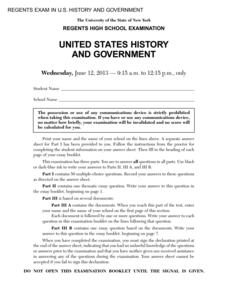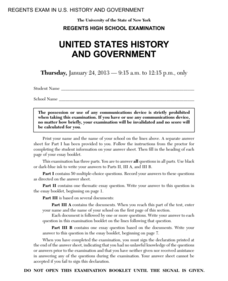Curated OER
Upholding Community Values Leadership, Government and Kings
Students analyze political systems of African cultures. In this political systems lesson, students compare and contrast the political systems of African cultures by studying objects of art for the values of the governments. Students...
School Improvement in Maryland
Building a Pyramid
After reviewing the structure and powers of the three branches of the US government, groups investigate a problem and research what is being done to address this criticism.
School Improvement in Maryland
Political Systems: Advantages and Disadvantages
Every political system has advantages and disadvantages. To gain an understanding of these differences, groups investigate the political system of another country—oligarchy, monarchy, dictatorship, parliamentary—and prepare a...
School Improvement in Maryland
Types of Economic Systems
As an introduction to economics, government classes investigate different types of economic systems (traditional, command, market or capitalist, mixed) to determine answers to basic question about how goods are produced.
Youth Outreach
Connecting the Separate Powers
Scholars demonstrate what they know about the separation of powers through role play. Two individuals act out a skit as the remaining class members discuss and decide whether the interaction they observed is an appropriate example of the...
School Improvement in Maryland
Affirmative Action
Do the government's affirmative action policies promote equity in the United States? The Fourteenth Amendment to the US Constitution and affirmative action policies come under scrutiny in an activity that asks class members to...
School Improvement in Maryland
Executive Order
After reading information about Executive Order #9066, class members assume the voice of an 18 year-old Japanese-American born in California and placed in an internment camp. Individuals then craft a letter to President Roosevelt...
School Improvement in Maryland
Pollution Data
Smog? Vog? What is being done about air pollution? Government classes investigate federal and state programs designed to improve air quality, and then develop a proposal for further actions that are needed.
School Improvement in Maryland
Smart Growth
New roads, new businesses, new developments, new mass transit systems. All growth has both positive and negative effects on communities. Government classes investigate the principles of Maryland's 1997 Smart Growth program and the...
School Improvement in Maryland
Demographic Investigation
What are the factors that influence voting patterns? How do these factors influence government funding? Is participation the squeaky wheel gets the grease? Class members interpret graphs and analyze trends to determine what demographic...
PBS
Evolution of the Presidency: Theodore Roosevelt to Franklin D. Roosevelt
How much power should a president be allowed to exert? Theodore Roosevelt and Franklin D. Roosevelt exercised their power according to their interpretations of the United States Constitution, and these interpretations affected the...
School Improvement in Maryland
Analysis of Marbury v. Madison
Should the United States Supreme Court have the power of judicial review? Instructors guide class members through a review of Marbury v. Madison and assist class members in writing a brief of the case. As independent practice,...
Curated OER
Chapter 10: Aggregate Expenditures (The Multiplier, Net Exports, and Government)
Effectively portraying the multiplier effect and the gaps within recession and inflation periods, these slides would be a good resource for both a beginning and advanced economics class. Clear, easy-to-read graphs and charts take viewers...
Curated OER
Chapter 30: Government and Market Failure
Complete with a navigation tool and list of key terms, the slides in this presentation are bursting with pertinent information for your young economists. From studying public goods to graphs that detail the collective willingness to pay,...
New York State Education Department
US History and Government Examination: August 2014
The Gulf War, the Vietnam War, and the Korean War all featured pivotal moments in United States foreign policy. Individuals consider how these conflicts changed the course of American diplomacy using an essay prompt and documents from a...
New York State Education Department
US History and Government Examination: June 2014
The 1960s marked a pivotal point for social and foreign policy in the United States. Using documents, such as speeches from Martin Luther King Jr. and John F. Kennedy, and authentic test prompts, class members consider the impact of this...
New York State Education Department
US History and Government Examination: August 2013
While the United States is now one of the strongest countries in the world, at its founding, it was plagued by controversies over the ratification of the Constitution, the Louisiana Purchase, and the expansion of slavery. Using a...
New York State Education Department
US History and Government Examination: June 2013
How successful has American foreign policy been in the past? Pupils consider the question as part of a state examination in American history. Other prompts include a document analysis and essay of important civil rights cases decided by...
New York State Education Department
US History and Government Examination: January 2013
While the 1950s seemed to be a time of peace and prosperity, Sputnik, the Korean War, and the Montgomery bus boycott were symptoms of the turmoil that loomed under the surface. Using documents, class members investigate what these events...
New York State Education Department
US History and Government Examination: January 2012
What led to the United States Civil War? Interested historians consider a variety of political, social, and economic factors using primary sources and an essay prompt in an authentic high-stakes test. Primary sources include political...
New York State Education Department
US History and Government Examination: June 2012
The reform movements—such as abolition, the push for women's suffrage, and the labor movement—shaped modern America. A document analysis activity and essay prompt help learners consider why. Other items in the high-level exam include an...
New York State Education Department
US History and Government Examination: January 2011
The presidencies of John F. Kennedy, Richard Nixon, and Ronald Reagan were defined by the Cold War. Using primary source documents and scaffolded analysis questions, pupils explore the effect the Cold War had on these presidencies. A...
New York State Education Department
US History and Government Examination: January 2010
From the trade of the colonial era to the Clean Water Act, water has shaped American history. Class members unpack how water affected the American story using primary sources that span events including the Lewis and Clark expedition to...
New York State Education Department
US History and Government Examination: August 2011
Using primary source documents, pupils consider how the United States' democratic story has evolved over time. A second essay question examines the role of geography in history, and multiple-choice questions sharpen test-taking skills.
Other popular searches
- U.s. Government
- Branches of Government
- Three Branches of Government
- 3 Branches of Government
- Types of Government
- State Government
- Forms of Government
- Local Government
- Canadian Government
- Us Government
- Government Agencies
- American Government

























